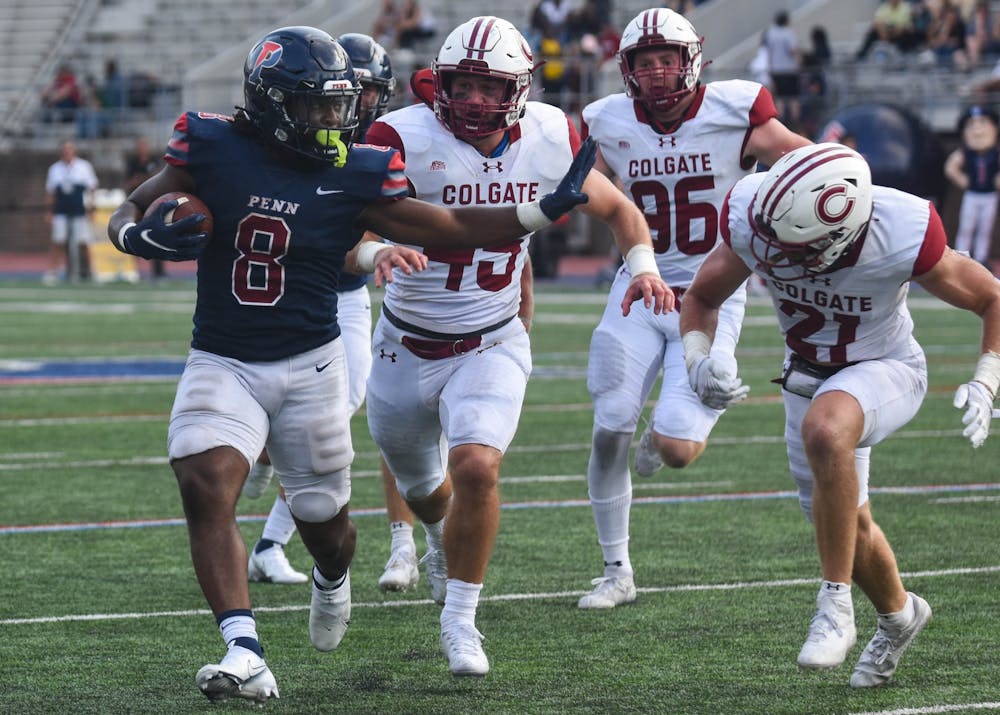
You shouldn’t fall into the trap of overreacting to a single game against a non-conference opponent. But man, did Penn look sharp in the second of half Saturday’s game against Colgate.
263-103 in total yards. 18-3 in first downs. 20:06-9:54 in time of possession. And most importantly, 22-0 on the scoreboard. All that after a first half in which the Quakers looked stagnant and sloppy offensively and the defense was one overthrow-turned-touchdown away from being busted wide open.
Trailing 14-3 at halftime, it was a resilient performance for a Penn squad that fell behind by double-digits on numerous occasions last season, but not once managed a comeback victory of the sort it produced on Saturday.
Sophomore quarterback Aidan Sayin struggled out the gate, throwing two interceptions, one of which for a costly pick-six, but gained his composure as the game wore on.
Aiding the young signal caller was new offensive coordinator Dan Swanstrom, who is already making his presence extremely felt in the Quaker gameplan. Against Colgate, 10 different Penn receivers caught at least one ball thrown by Sayin. The last time that many receivers hauled in a catch during a game for Penn was in October 2015, when Swanstrom was still just a quarterbacks coach for the Quakers and hadn’t yet left to take the head coaching job at Ithaca College.
Spreading the wealth seems to be the new mantra for Penn, and Sayin appears to be comfortable with it, as the sophomore finished Saturday’s game with a career-high of 289 yards and two touchdowns.
Defensively, it’s hard to even argue that the group was resilient because the unit held firm throughout.
Against a team notable for its run-heavy offensive attack (in their last game, the Raiders ran the ball 42 times and threw it 12 times), the Quakers were in for a stiff challenge, given their third-to-last run defense in the Ivy League last season and the loss of key defenders Prince Emili and Brian O’Neill.
Yet, Penn prevented any game-changing runs, and the Red and Blue held Colgate to just 43 net rushing yards, the Raiders’ lowest total since October 2019. It was a dominant performance for a defensive front led by senior captains Jake Heimlicher, who finished with two sacks and two tackles for loss, and Jonathan Melvin, who tallied 2.5 TFLs, tying his career-high.
All units seemed to be clicking for Penn — in the second half, that is — and it fosters hope in a team that faltered mightily last season and now sits less than two weeks out from Ivy League play.
But is there also room for concern based on this game? Absolutely.
A key reason why Penn was able to so handily dominate the second half was because several Colgate players fell injured early on. Coach Ray Priore attributed those injuries to the afternoon heat at Franklin Field that Penn proved to be better prepared for.
If that was the deciding factor in this one — which it very well may have been — I’d be worried about Penn’s chances in the thick of Ivy League play. In tight contests against top Ivy programs like Dartmouth and Harvard, Penn won't be able to count on teams being unprepared for game conditions.
And although the offense looked more dynamic than it did last season, Priore continued to play it safe in crucial situations. At the end of the longest drive of the game by either team — 16 plays, seven minutes — the Quakers found themselves in a fourth-and-goal at the Colgate three-yard-line. Priore opted to kick a field goal, and when asked about the decision postgame, he emphasized the need to put points on the board and leave the drive with something.
What does that tell the offense, though? It signals that they’re not trusted to go out and get three yards in a big situation. Priore needs to have faith in his team to make plays in those instances, or else he runs the risk of repeating last season’s mistakes, when his notoriously conservative decision-making cost Penn on numerous occasions.
After Penn football’s worst season since 2014, it can be easy to fall back into the pattern of assessing the team’s weak spots and expecting them to continue to manifest as the season wears on (Priore's risk-averse decision-making especially).
But in their season-opener, the Quakers showed a level of resiliency and poise that they just didn’t possess at any point last season, and leads me to believe that this team might just be vastly different from the year before.

MATTHEW FRANK is a Senior Sports Editor for The Daily Pennsylvanian and is a College junior from Miami studying English. He can be reached at frank@thedp.com.
The Daily Pennsylvanian is an independent, student-run newspaper. Please consider making a donation to support the coverage that shapes the University. Your generosity ensures a future of strong journalism at Penn.
Donate






